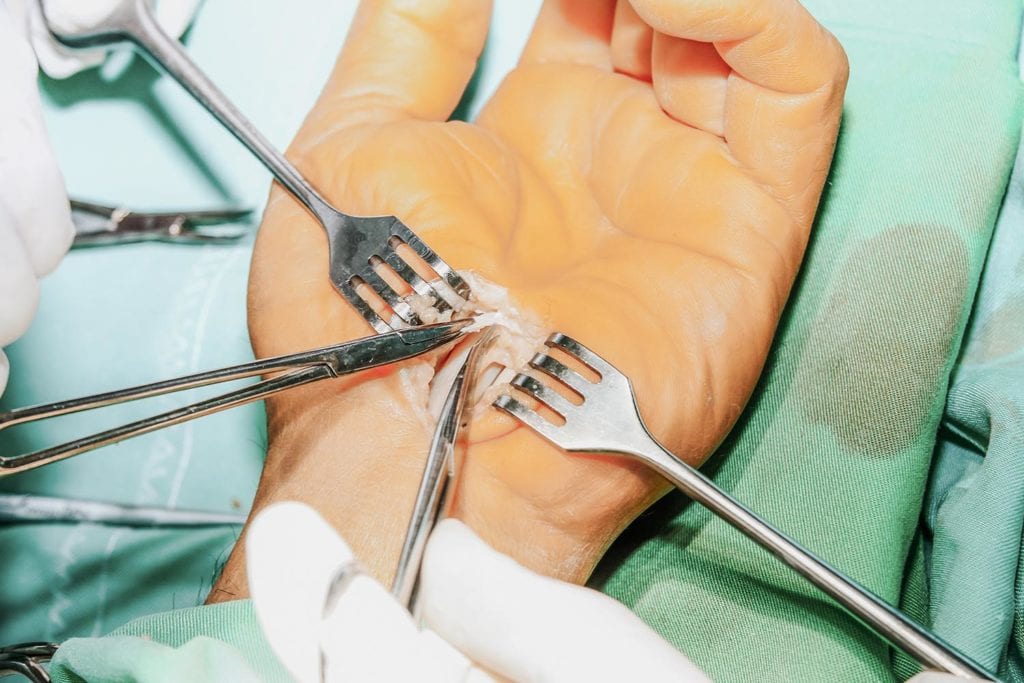Carpal tunnel surgery occurs approximately 500,000 times a year in the United States. Yes, you read that correctly! Doctors performing this surgical treatment are most commonly orthopedic surgeons or neurosurgeons. in the recent past, primary care doctors have referred patients with carpal tunnel syndrome to surgeons for evaluation and treatment. Surgeons overwhelming treat carpal tunnel syndrome with, you guessed it, surgery. There is now a wealth of medical research describing surgical alternatives for carpal tunnel syndrome. In fact, some experts believe most patients diagnosed with carpal tunnel syndrome may not require surgery.
Carpal Tunnel Syndrome Surgery Alternatives
Although there are many thousands of successful carpal tunnel release surgeries performed yearly, many surgical patients may have done well with non-surgical alternatives. There are several medical studies with clear and convincing evidence of improvement with conservative treatment of carpal tunnel syndrome. Despite this, many patients end up with a surgical procedure as their initial treatment for carpal tunnel syndrome. Wouldn’t most patients want to consider a surgery-free alternative before going under the knife?
The challenge is that many patients don’t receive complete information about the non-surgical options to carpal tunnel surgery. Your surgical team may not even be aware of the latest techniques and effectiveness of modern surgery-free treatments. After all, they are focused on the surgical treatment of your disease.
Given a viable option for receiving modern surgery-free carpal tunnel syndrome treatment, most patients would prefer to avoid surgery. However, if your primary care doctor is also unaware of your alternatives to surgery, you may never get the opportunity. 
8 Carpal Tunnel Syndrome Surgery Facts
-
500,000 carpal tunnel syndrome surgeries are performed annually
-
A significant number of carpal tunnel surgeries fail and may need another surgery
-
“Blind” carpal tunnel injections are often performed by surgeons
-
Interventional specialists recommend image-guided treatments for safety & effectiveness
-
Carpal tunnel syndrome can be graded as mild, moderate, or severe
-
Conservative treatment is highly recommended without severe disease
-
Carpal tunnel surgery recovery can take many weeks
-
Conservative treatment often requires no time off from work for recovery
Interventional Specialists Provide Surgery Alternatives
For the reasons above, we recommend an evaluation with an interventional specialist before you have carpal tunnel surgery. An interventional specialist provides you with the full range of carpal tunnel treatment options.
Our Interventional Specialists provide an extensive evaluation, treatment, and procedures to allow patients to avoid surgery for carpal tunnel syndrome. We utilize the latest diagnostics, electrodiagnostic studies, therapy, and image-guided treatments enabling the majority of our patients to avoid surgery. Only those patients that fail conservative treatment options should require the pain, risk, expense, and extended recovery time of carpal tunnel surgery.
Call today to schedule your complete carpal tunnel syndrome evaluation and learn about your surgery alternatives.
Carpal Tunnel Syndrome Referrals
Many patients with symptoms that may be related to carpal tunnel syndrome are seen first by their primary care doctor. If carpal tunnel syndrome is suspected, they are often referred directly to a surgeon. Many times, this decision is made out of habit or due to a personal relationship. Other times, the choice is made by clinic staff, or an internal hospital referral department focused on generating surgical referrals. Unfortunately, it may be up to the patient to identify all the treatment alternatives that may benefit them outside of surgery.
Our specialty clinic schedules those seeking surgery-free carpal tunnel treatment options every day. We do not require a referral from your primary care doctor. You may call us directly to book your appointment or choose your preferred appointment time through our online scheduling tool.
Evaluation of Carpal Tunnel Syndrome
Once you have identified a specialist capable of assessment and diagnosis, the most crucial part of the process gets underway. Evaluation of patients with carpal tunnel begins with taking a complete medical history and physical exam. Beyond this vital step, patients will often undergo specialized testing, including muscle testing, nerve conduction studies, and electromyography. Our specialists also perform advanced high-frequency ultrasound imaging to identify and measure the specific nerve involved in carpal tunnel disease. There is a tremendous amount of variability between patients’ anatomy within the carpal tunnel. The painless diagnostic ultrasound examination technique provides uniquely helpful information in your diagnosis. Once the diagnosis is established, and the severity of your carpal tunnel syndrome is known, treatment begins.
We have prepared an online tool for you to complete and get an idea of how your symptoms are affecting you. This validated tool is one of the measures used to establish the severity of your carpal tunnel syndrome symptoms. Click here to get your carpal tunnel score.
Carpal Tunnel Syndrome: Causes and Risk Factors
Carpal tunnel syndrome is thought to occur due to compression of the median nerve within the carpal tunnel canal in the wrist. Risk factors for carpal tunnel syndrome include careers requiring the extended use of the hands, such as electricians, painters, and those using tools daily. In addition, those with systemic diseases such as rheumatoid arthritis, lupus, and diabetes can also increase your risk. Some other reported factors include a history of a wrist or arm trauma, and females are much more commonly impacted.
Surgery-Free Carpal Tunnel Syndrome Treatment
Our approach includes a multi-modality, surgery-free treatment protocol utilizing splinting, therapy, and interventional treatments of the carpal tunnel. All of these treatments have been shown to provide improvement in medical research studies. In particular, interventional treatment has provided substantial relief to patients suffering from carpal tunnel syndrome.
We perform carpal tunnel treatment under direct visualization of the median nerve. The median nerve remains in view by utilizing ultrasound to image inside your wrist as we work. This technique provides a unique level of safety and effectiveness during the non-surgical treatment of your wrist.
 In the video below, you can visualize the median nerve which is the oval, honeycomb-shaped object. The nerve is approximately 3 millimeters thick which is about the thickness of two dimes stacked on top of one another. The performance of this procedure is impossible without modern high-frequency ultrasound equipment. A “blind” injection is often performed by surgical specialists and does not afford any of the visualization safety and precision of advanced ultrasound-guided treatment. In addition, nerve anatomy can be directly visualized and characterized should surgery ever be needed in cases of severe carpal tunnel syndrome. Awareness of any anatomical variability allows the ability to plan for an approach less likely to cause unnecessary damage and complications in the future. Beyond this, there is the ability to painlessly monitor patient progress at follow up visits.
In the video below, you can visualize the median nerve which is the oval, honeycomb-shaped object. The nerve is approximately 3 millimeters thick which is about the thickness of two dimes stacked on top of one another. The performance of this procedure is impossible without modern high-frequency ultrasound equipment. A “blind” injection is often performed by surgical specialists and does not afford any of the visualization safety and precision of advanced ultrasound-guided treatment. In addition, nerve anatomy can be directly visualized and characterized should surgery ever be needed in cases of severe carpal tunnel syndrome. Awareness of any anatomical variability allows the ability to plan for an approach less likely to cause unnecessary damage and complications in the future. Beyond this, there is the ability to painlessly monitor patient progress at follow up visits.
As the injection is performed, the nerve can be seen to “peel free” from the retinaculum tissue above. This procedure is performed in the comfort of a state-of-the-art procedure room equipped with the latest imaging and medical equipment.
Surgery-Free Carpal Tunnel Syndrome Recovery
Using these treatment techniques, you can resume your daily activities immediately. Patients often begin to report significant improvement within 1 to 2 weeks following the treatment. Patients still able to work before their procedure don’t have to schedule time off from work for recovery, an invaluable benefit of non-surgical treatment.
Carpal Tunnel Surgery Alternatives Conclusion
Modern techniques utilizing high-frequency ultrasound procedures to treat carpal tunnel syndrome have changed the traditional approach to treatment. Unfortunately, many patients diagnosed with the condition remain unaware of their carpal tunnel surgery alternatives.
At Elite Pain & Health, we provide an extensive array of modern medical evaluation and treatment, enabling the non-surgical treatment of most patients. Contact us today for your complete carpal tunnel syndrome evaluation.

 CALL TODAY!
CALL TODAY! 

